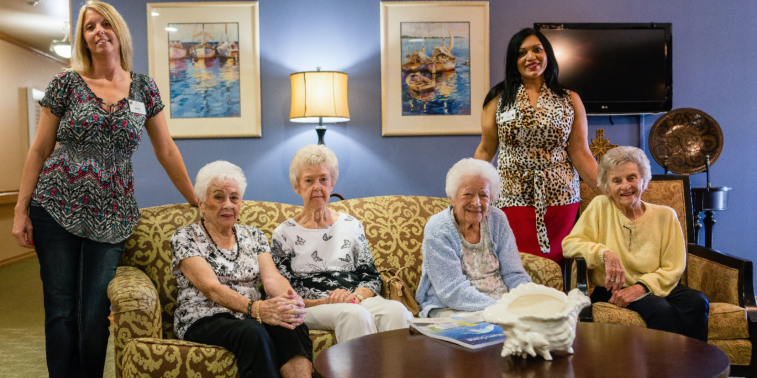Top Memory Care Facilities Charlotte: Making Sure Convenience and Security for Seniors
Top Memory Care Facilities Charlotte: Making Sure Convenience and Security for Seniors
Blog Article
Reliable Dementia Care Strategies for a Better Lifestyle
In the world of mental deterioration care, the execution of reliable approaches is crucial for boosting the quality of life for both individuals influenced by the disease and their caregivers. Understanding the distinct phases of mental deterioration enables tailored interventions that deal with the progressing requirements of people-- from promoting cognitive interaction in the beginning to making sure dignity in late-stage treatment. The importance of communication techniques and a supportive environment can not be overemphasized. What certain methods can be taken on to cultivate an ambience of empathy and link throughout this tough trip?
Understanding Dementia Phases

In the early phase, individuals might experience moderate memory loss and trouble with familiar tasks. Care strategies need to focus on keeping freedom and giving cognitive stimulation. In the late stage, people may shed the capacity to interact and require help with everyday tasks.
Identifying these stages permits caregivers to adapt their methods and offer support that straightens with the individual's current needs, inevitably assisting in better management of the problem and improving the total caregiving experience. Understanding mental deterioration phases is consequently a foundational aspect of efficient dementia care.
Communication Strategies
Effective communication is a vital component of dementia treatment, particularly as the disease proceeds via its various stages. As cognitive abilities decline, it comes to be necessary to adjust interaction techniques to fulfill the requirements of individuals with mental deterioration. Making use of clear, easy language is vital; caretakers need to stay clear of intricate sentences and lingo, deciding rather for simple, concise expressions.
Non-verbal communication plays a similarly substantial duty. Faces, gestures, and tone of voice can share warmth and understanding, commonly enhancing spoken messages. Maintaining eye get in touch with and an open posture fosters a feeling of link and security, motivating people with mental deterioration to engage more fully in conversations.
It is also helpful to be individual and enable enough time for responses. People might need added time to procedure info and create their thoughts. Duplicating or rephrasing concerns may be required if comprehension appears lacking.
Lastly, focusing on the person's passions and individual history can promote much more significant interactions. Participating in familiar subjects can evoke positive memories and emotions, better enriching the communication experience (charlotte care home). By using these strategies, caretakers can substantially boost the high quality of communications, advertising self-respect and respect for individuals coping with dementia
Developing a Safe Setting
Producing a safe atmosphere for individuals with mental deterioration is necessary to promoting their health and self-reliance. A properly designed space can dramatically lower the threats of mishaps and boost the lifestyle for those affected by this condition. Key factors to consider consist of reducing mess and guaranteeing clear pathways to assist in mobility. Getting rid of or protecting possible threats, such as loosened rugs, sharp things, or toxic substances, is vital in preventing drops and injuries.
Lighting plays a crucial role too; making use of natural light any place possible and including night lights can aid people navigate their surroundings safely. Furthermore, classifying areas and essential objects can aid memory and orientation, lowering confusion and anxiety.
It is also crucial to produce a familiar environment by personalizing the space with pictures or treasured products, which can stimulate positive memories and a sense of belonging.
Including furnishings that is both useful and comfy adds to a supportive environment, enabling people to involve in everyday activities effortlessly. Ultimately, a risk-free atmosphere not only safeguards versus physical dangers however also cultivates a complacency, which is necessary for the emotional wellness of those dealing with dementia.
Involving Routines and tasks
Involving activities go to the website and organized routines are vital parts in the care of individuals with mental deterioration, as they promote cognitive function, psychological security, and social communication. These tasks need to be customized to the person's passions, capabilities, and stage of cognitive decline. memory care charlotte. Straightforward, repeated tasks such as gardening, arts and crafts, or cooking can offer purposeful engagement, allowing people to utilize their skills while promoting a sense of achievement
Establishing a daily regimen aids develop a foreseeable setting, which can reduce anxiousness and complication. This framework can consist of designated times for dishes, activities, and remainder, making certain a balanced approach to day-to-day live. Including social communications right into these routines, such as team tasks or visiting family members, further boosts psychological well-being and battles feelings of isolation.
In addition, exercises, such as strolling or dancing, not just promote physical wellness however likewise promote mental engagement. Motivating engagement in area events or support teams can give added opportunities for socializing. Generally, the combination of interesting tasks and structured routines is essential in improving the lifestyle for people with mental deterioration, fostering freedom and self-respect while resolving their distinct requirements.
Sustaining Caretaker Wellness
Looking after individuals with mental deterioration can be a demanding and mentally straining experience, making it necessary to prioritize the well-being of caretakers. Caretakers typically encounter high levels of anxiety, stress and anxiety, and physical fatigue, which can lead to burnout otherwise addressed appropriately. To support their wellness, it is necessary to apply a complex technique.
First, offering caretakers with accessibility to education and sources can equip them with methods to manage day-to-day obstacles. Assistance groups, both in-person and online, supply a system for sharing experiences, promoting a feeling of community, and lowering feelings of isolation. In addition, break treatment services enable caregivers to take necessary breaks, permitting them time to attend and recharge to their own health and wellness demands.
Additionally, motivating caretakers to participate in self-care methods-- such as normal exercise, check these guys out healthy eating, and mindfulness-- can considerably improve their strength. Promoting open communication about their feelings and challenges with member of the family or professionals also aids alleviate psychological burdens.
Final Thought
To conclude, effective mental deterioration treatment methods encompass a detailed understanding of the condition's stages, the application of clear communication strategies, the facility of a secure setting, and the promotion of organized routines and engaging activities. Furthermore, focusing on the wellness of caregivers is important to sustaining quality care. By integrating these strategies, the overall high quality of life for people with dementia can be dramatically improved, fostering an encouraging environment that promotes dignity and emotional wellness.
In the realm of mental deterioration treatment, the implementation of effective approaches is critical for enhancing the quality of life for both people influenced by the illness and their caretakers. By utilizing these techniques, caretakers can considerably improve the top quality of interactions, advertising dignity and respect for individuals her response living with dementia.

Caring for people with mental deterioration can be a demanding and mentally straining experience, making it crucial to prioritize the well-being of caregivers.
Report this page